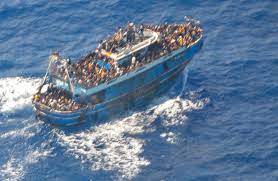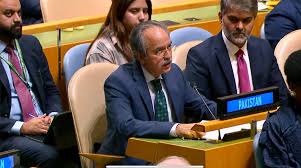EU watchdog launches investigation into Frontex’s role in deadly Adriana shipwreck

Brussels: The European Union’s watchdog on Wednesday launched an investigation into the role Frontex played in one of the deadliest migrant shipwrecks in recent history.
Among the documents EU Ombudsman Emily O’Reilly has demanded access to is the formal report by the Union’s external border agency about how events unfolded when the Adriana boat sank on 14 June off the coast of Greece.
Up to 750 people were on board the fishing vessel. Only 104 survived while 82 bodies were recovered.
The tragedy reignited sharp criticism of the Greek coastguard as well as Frontex who are accused of not taking the necessary actions that could have prevented the shipwreck.
Frontex has said it offered assistance to the Greek authorities after the overcrowded boat was spotted but that both calls went unanswered. Greek authorities have meanwhile defended its operation — a single ship was sent but offered no assistance after the captain of the trawler reportedly refused help in order to continue sailing towards Italy.
An investigation has been launched at the national level but O’Reilly said in a statement that “Frontex’s role in search and rescue operation also needs to be clarified.”
“A tragedy of this magnitude requires all those involved to reflect on their responsibilities and to be clear to the public who is accountable for these deaths. My Office will focus on the role of Frontex as we try to piece together the events that led to the capsizing of the boat and the deaths of at least 500 people.”
“Migration to Europe will continue and it is up to the EU to ensure that it acts in a way that maintains fundamental rights and does not lose sight of the human suffering that compels people to seek a better life beyond their home countries,” said the Ombudsman.
Frontex ‘helped rescue 28,000 people this year’
As part of the own-initiative inquiry, O’Reilly is also asking for details about how national authorities and Frontex communicate over search and rescue operations and about the rules for the use of cameras mounted on boats during joint operations. She is also demanding clarification over whether Frontex reports on fundamental rights violations with regard to the interactions of national authorities with NGO vessels that rescue people at sea.
Both the Greek coastguards and Frontex have been accused of violating fundamental human rights in recent years by either carrying out of turning a blind eye to migrant pushbacks at sea.
A report by OLAF, the EU’s anti-fraud agency, that was leaked late last year documented multiple such pushbacks in the Aegean Sea between 2020 and 2021 that were covered up by Frontex.
The scandal led to the resignation of Fabrice Leggeri as Frontex chief with his successor, Hans Leijtens vowing to end the practice when he come into office.
Frontex said in a statement to Euronews that they “look forward to fully cooperating with the Ombudsman to explain the role Frontex plays in search and rescue operations.”
“It is important to note that Frontex does not coordinate search and rescue operations. This is the responsibility of the national rescue coordination centres. Nevertheless, Frontex sees the rescue of lives at sea as one of its essential roles and provides all the necessary support to national authorities when needed.
“This means that Frontex vessels conduct search and rescue operations when called upon. In addition, both Frontex vessels and aircraft provide rescue centres and rescuers with information vital to saving lives.
“Just this year, Frontex helped to rescue nearly 28,000 people”, a spokesperson added.
‘We need to trust national judicial systems’
The Ombudsman office also announced on Wednesday that it will launch a second investigation later this year into the role of EU institutions in upholding fundamental rights in border management activities.
The European Commission has always maintained that border management is a competence of member states and that any possible violation of international and humanitarian law must be carried out by national authorities.
Home Affairs Commissioner Ylva Johansson reiterated this stance during a grilling by the European Parliament’s Justice Committee earlier this month.
Asked whether the EU executive could facilitate an independent and transparent investigation into the June shipwreck, she stressed that “member states are responsible for these kinds of investigations […] we need to trust the judicial system in member states.”
“There is an urgent need for a thorough, transparent and effective investigation, and I agree that this is important for many reasons, not least for the Greek reputation,” she added.
Greek investigations over the last few years into allegations of human rights violations in their handling of migrants have always cleared their agencies of any wrongdoing.





